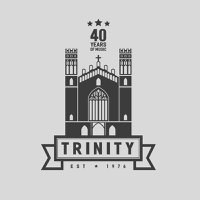40 Years of Music
- https://archive.trinitybristol.org.uk/events/40-years-of-music
- 40 Years of Music
- 1977-01-01T10:55:00+00:00
- 1977-01-02T10:55:00+00:00
- Trinity's early musical history, 1970s-80s
- What bristol_sound activities archive
- When 01 Jan, 1977 10:55 AM to 02 Jan, 1977 10:55 AM (UTC / UTC0)
-
Add event to calendar
iCal
March 1976 - the final hymn rings around the almost vacant pews of Holy Trinity. A praise song and a funeral rite calling time on a church once described as 'the cathedral of the East'. The music that followed could not have been more different.

Eek a Mouse play Trinity Hall in the 1980's
In January 1977 the Church commissioners approved the sale of the deconsecrated building to the Bristol Caribbean Community Enterprise Group.
The association's aim was not to create a music venue, but Trinity became widely associated with music partly because the emergent punk and reggae scenes had outgrown venues such as Horley Road, Docklands Settlement, Locarno. the Bamboo club & the Britannia Road pub.
Sound clash nights were a major draw for black youth in Bristol and further afield, as sounds systems competed to be the dominant 'the Champion' sound. Similarly, punk bands such as the X-Certs could pull in crowds numbering in the 100s.
Regular alternatives were few - punks were unwelcome at many city centre venues where the dress code conformed to the disco aesthetic. The second generation of black Britons also felt excluded from the night club mainstream, as one former Trinity regular explained; "we still didn't really have a lot of access to white clubs. Y'know...its probably it was racism and the fact that the black community was kinda young in Bristol."
Encouraged by Trinity's manager Roy De Freitas, Mark Simpson - a promoter with a key eye and ear for emerging bands - helped to put Trinity on the map.
Memorable sound clash nights included Tarzan and Quaker City. According to one account; "they mash up that night."
Known for his distinctive scatting style and prison style dress Eek-a-Mouse (pictured right, courtesy of Beezer) was one of many reggae legends to grace Trinity's stage.

New Order flyer (note the £2 entry fee!)
Bristol's major punk bands the aforementioned X-Certs, Art Objects, Blue Wave, Vice Squad, Crass were almost resident in the space. As a testament to it's reputation for live music, Trinity hosted Bristol's first Festival of Punk in 1981.
Ska and two-tone bands such as The Specials - with their characteristic fusion of rock and reggae - drew in a mixed audience, at a time when this was relatively rare. The musical subcultures inhabiting Trinity rarely met on the same night, although many punk bands inspired by the Clash shared the band's anti-racist stance.
Rock against Racism (RAR) 1978 was, "the first time you had like reggae bands playing with punk bands." The concert featured for the first time, reggae bands Misty n Roots and Reality on the same line up with the X-Certs. Events such as these were important brokers for cultural dialogue in a city that was deeply divided along lines of race and class.
Rock Against Racism was one aspect of a broader left wing culture that permeated Trinity. In politically divided times the left was united its opposition to Thatcherism and the conflicts her government engendered.
In keeping with Trinity's left wing credential's, the socialist influenced rock group the Redskins played a gig in support of the nationwide miners strike on the 21st December 1984 to a Trinity crowd of 500. Punk DJ Bear Hackenbush remembered that striking miners marching via Bristol on their way to London, slept at Trinity overnight.
Trinity's importance as a venue for a particular kind of music and culture was part of a wider membership of the general DIY culture of the Bristol art and music scene. So much so that it was a regular venue for the Ashton Court fund-raiser. Typically the fund-raiser attracted local and touring bands of varying profiles.
In hindsight a 1980 gig was particularly memorable for a little known but much feted band, U2 which graced the stage. Post rock Bristol stalwarts recalled feeling rather underwhelmed by the performance of the young pretenders. As one member suggested; "You didn't think you were looking at a group that was gonna be the biggest group in the world in a year."
New Order was another cult band that graced Trinity's stage during its first incarnation as a music venue. Sadly the night became even more marked by the death soon after of its iconic lead singer Ian Curtis.
With its appeal to local and national profile bands Trinity's star was in the ascendancy. But its success masked cracks that were appearing behind the scenes.

Fundraiser flyer - with the Stingrays on the lineup
In June 1982 highly respected promoter Mark Simpson left acrimoniously owing to a dispute with the organisation. Manager Michael De Freitas also fell out with the management and resigned in 1983.
But it was the cost of repairs which ultimately caused Trinity's demise. Shoddy building work by local contractors left the organisation with debts of over £100,000 to various creditors. Trinity was forced into receivership in 1984. Ownership of the building transferred to Midland Bank the following year. The curtains closed on a much loved Bristol venue but not, as it transpired, for long…
If you want to amend, argue with, or add to the story of Trinity in this and later period contact Dr Edson Burton on edson@trinitybristol.org.uk

